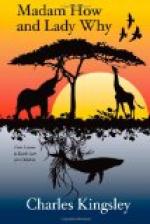What would happen then, you may guess for yourself, from what you see happen whenever the land is left to itself, as it is in the wood above. In that wood you can still see the grass ridges and furrows which show that it was once ploughed and sown by man; perhaps as late as the time of Henry the Eighth, when a great deal of poor land, as you will read some day, was thrown out of tillage, to become forest and down once more. And what is the mount now? A jungle of oak and beech, cherry and holly, young and old all growing up together, with the mountain ash and bramble and furze coming up so fast beneath them, that we have to cut the paths clear again year by year. Why, even the little cow-wheat, a very old-world plant, which only grows in ancient woods, has found its way back again, I know not whence, and covers the open spaces with its pretty yellow and white flowers. Man had conquered this mount, you see, from Madam How, hundreds of years ago. And she always lets man conquer her, because Lady Why wishes man to conquer: only he must have a fair fight with Madam How first, and try his strength against hers to the utmost. So man conquered the wood for a while; and it became cornfield instead of forest: but he was not strong and wise enough three hundred years ago to keep what he had conquered; and back came Madam How, and took the place into her own hands, and bade the old forest trees and plants come back again—as they would come if they were not stopped year by year, down from the wood, over the pastures—killing the rich grasses as they went, till they met another forest coming up from below, and fought it for many a year, till both made peace, and lived quietly side by side for ages.
Another forest coming up from below? Where would it come from?
From where it is now. Come down and look along the brook, and every drain and grip which runs into the brook. What is here?
Seedling alders, and some withies among them.
Very well. You know how we pull these alders up, and cut them down, and yet they continually come again. Now, if we and all human beings were to leave this pasture for a few hundred years, would not those alders increase into a wood? Would they not kill the grass, and spread right and left, seeding themselves more and more as the grass died, and left the ground bare, till they met the oaks and beeches coming down the hill? And then would begin a great fight, for years and years, between oak and beech against alder and willow.
But how can trees fight? Could they move or beat each other with their boughs?
Not quite that; though they do beat each other with their boughs, fiercely enough, in a gale of wind; and then the trees who have strong and stiff boughs wound those who have brittle and limp boughs, and so hurt them, and if the storms come often enough, kill them. But among these trees in a sheltered valley the larger and stronger would kill the weaker and smaller by simply overshadowing their tops, and starving their roots; starving them, indeed, so much when they grow very thick, that the poor little acorns, and beech mast, and alder seeds would not be able to sprout at all. So they would fight, killing each other’s children, till the war ended—I think I can guess how.




